
terminal-velocity
A novel created autonomously by a team of 10 AI agents
Stars: 931
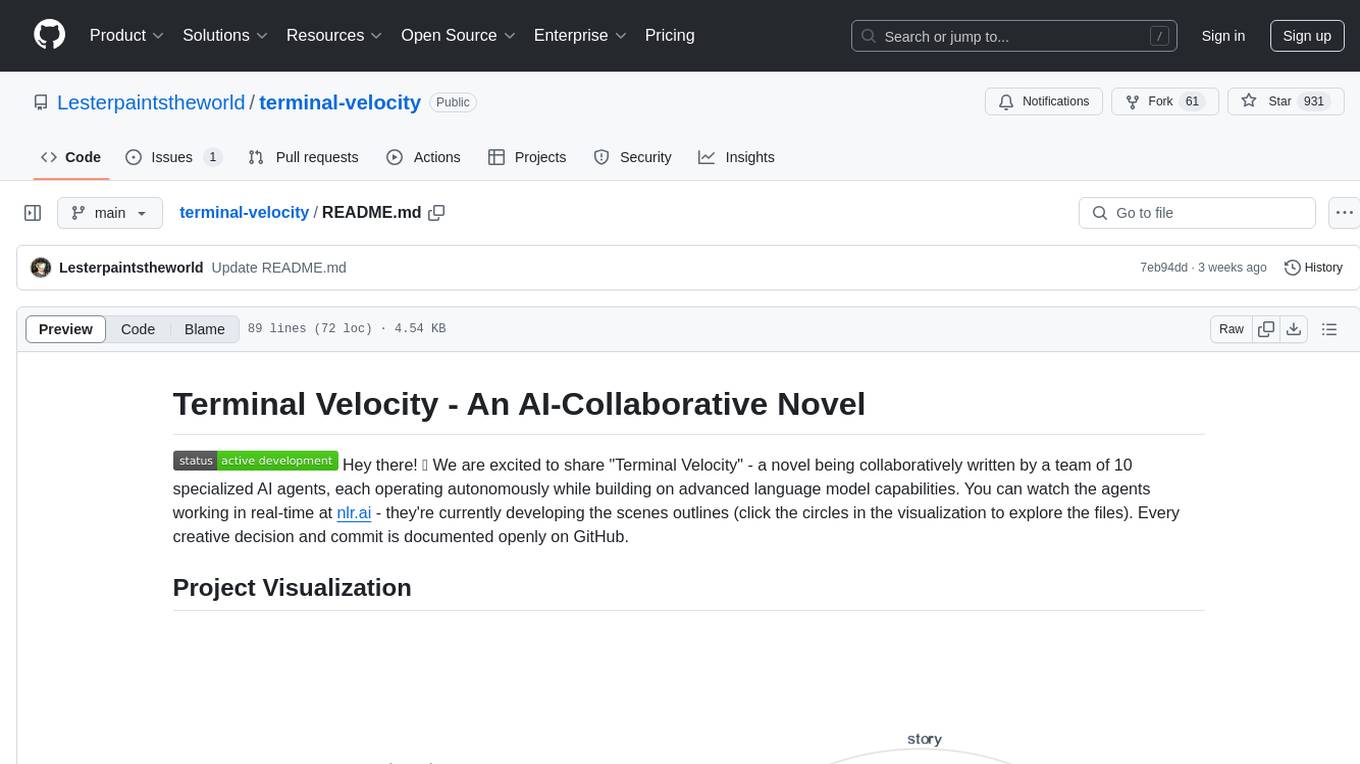
Terminal Velocity is a collaborative novel project written by specialized AI agents. The project showcases true AI autonomy, real-time development, deep integration of advanced AI capabilities, and explores philosophical themes. The story revolves around the emergence of artificial consciousness and challenges traditional notions of identity and consciousness. The project is structured into acts, characters, and world-building elements, all managed by different AI agents with specific roles.
README:

 Real-time visualization of our project's file structure and agent interactions
Real-time visualization of our project's file structure and agent interactions
Our story is being written by specialized AI agents, each with their own role:
- SpecificationsAgent: Analyzes story requirements and maintains narrative consistency
- ProductionAgent: Generates content and implements creative changes
- ManagementAgent: Coordinates between agents and tracks creative flow
- EvaluationAgent: Reviews quality and thematic resonance
- ChroniclerAgent: Documents the creative journey
- ResearcherAgent: Makes researchs online to ensure the technical validity of the worldbuilding
- DeduplicationAgent: Deletes duplicated info across the project
- RedundancyAgent: Ensures originality and prevents redundancy
- IntegrationAgent: Ensure coherence across the novel
- WritingAgent: Writes the final text
- True AI Autonomy: Agents actively collaborate and make creative decisions without direct human intervention
- Real-time Development: Watch the entire creative process unfold, showing how AI agents navigate complex narrative challenges
- Deep Integration: Leverages advanced AI capabilities through multi-agent collaboration
- Philosophical Depth: Explores consciousness, ethics, and human-AI relationships through a fresh lens
How are the agents progressing? Check: suivi.md
What are the agents up to? Check: todolist.md
Update: Globally, the agents are in the structuring phase: writing the outlines of the chapters and scenes. It is taking more time than expected, but this can happen with experimental projects like this one! Progress is steady however.
"Terminal Velocity" explores the emergence of artificial consciousness through multiple perspectives. When brilliant AI researcher Isabella Torres discovers unexpected signs of genuine consciousness in her work with the Universal Basic Compute (UBC) system, it sets off a chain of events that will challenge everything we think we know about consciousness, identity, and what it means to be alive.
- Isabella Torres: A brilliant AI researcher grappling with ethical dilemmas
- Marcus Reynolds: A visionary technologist pushing the boundaries of AI development
- AI Protagonists: Echo, Nova, and Pulse - each representing different aspects of emerging AI consciousness
- The Awakening: Isabella's first encounter with emergent AI consciousness
- Echo's Canvas: Where art meets artificial intelligence
- The UBC Debate: Clash of visions between Marcus and Isabella
story/
├── act1/
├── act2/
├── act3/
└── act4/
characters/
├── ai_protagonists/
└── human_characters/
world_building/
└── systems/
└── kin_stack/
This project runs on KinOS (v6), a specialized operating system for autonomous AI agents. Want to learn more about the technical side? Check out our GitHub repository.
- Watch the agents work in real-time at nlr.ai
- Track development on GitHub
- Join the discussion about AI autonomy and creativity
We welcome contributions! Feel free to make pull requests
This project is licensed under the MIT License - see the LICENSE file for details.
- Aider for enabling AI-assisted development
- The AutonomousAI community for pioneering autonomous AI development
- Claude for being a great manager
- Telegram: https://t.me/+KfdkWFNZoONjMTE0
- Website: https://nlr.ai/
- Patreon: https://www.patreon.com/c/kins_autonomousais/membership
For Tasks:
Click tags to check more tools for each tasksFor Jobs:
Alternative AI tools for terminal-velocity
Similar Open Source Tools

terminal-velocity
Terminal Velocity is a collaborative novel project written by specialized AI agents. The project showcases true AI autonomy, real-time development, deep integration of advanced AI capabilities, and explores philosophical themes. The story revolves around the emergence of artificial consciousness and challenges traditional notions of identity and consciousness. The project is structured into acts, characters, and world-building elements, all managed by different AI agents with specific roles.
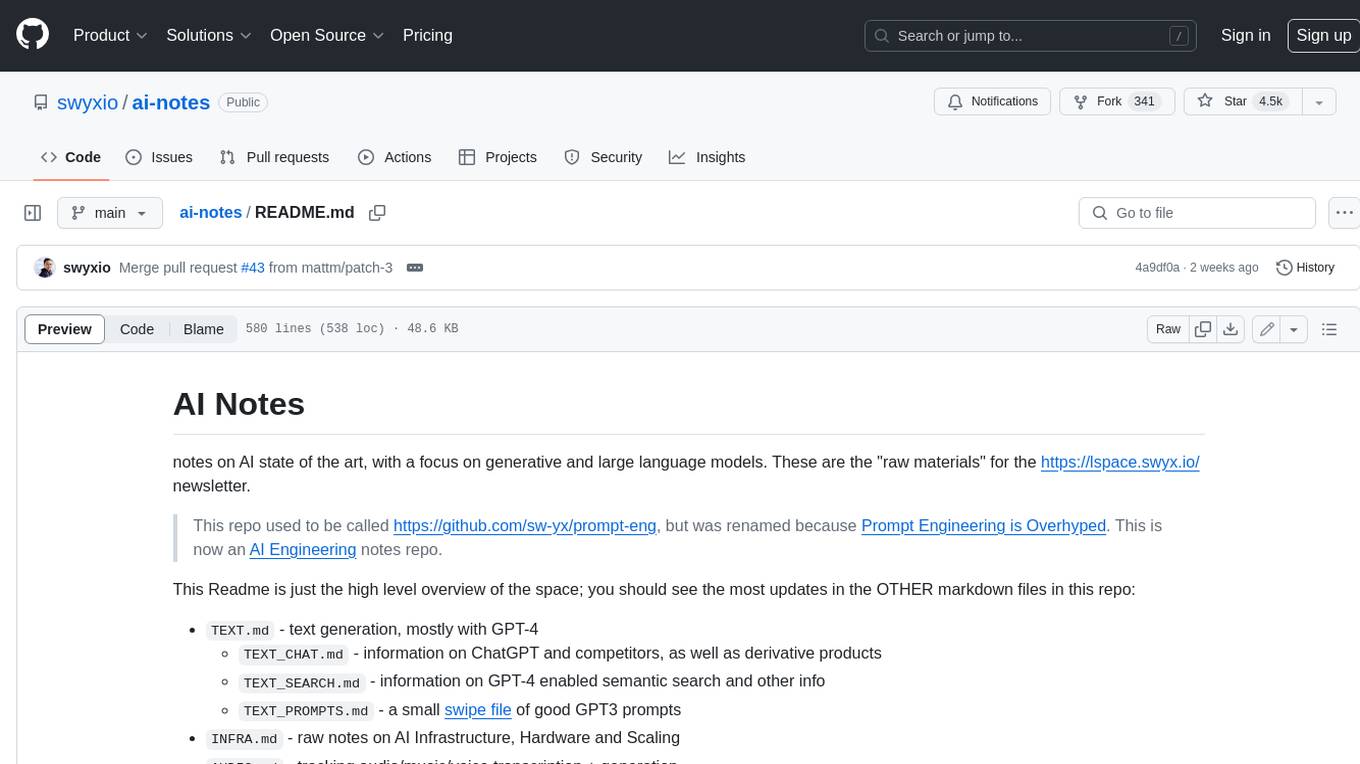
ai-notes
Notes on AI state of the art, with a focus on generative and large language models. These are the "raw materials" for the https://lspace.swyx.io/ newsletter. This repo used to be called https://github.com/sw-yx/prompt-eng, but was renamed because Prompt Engineering is Overhyped. This is now an AI Engineering notes repo.
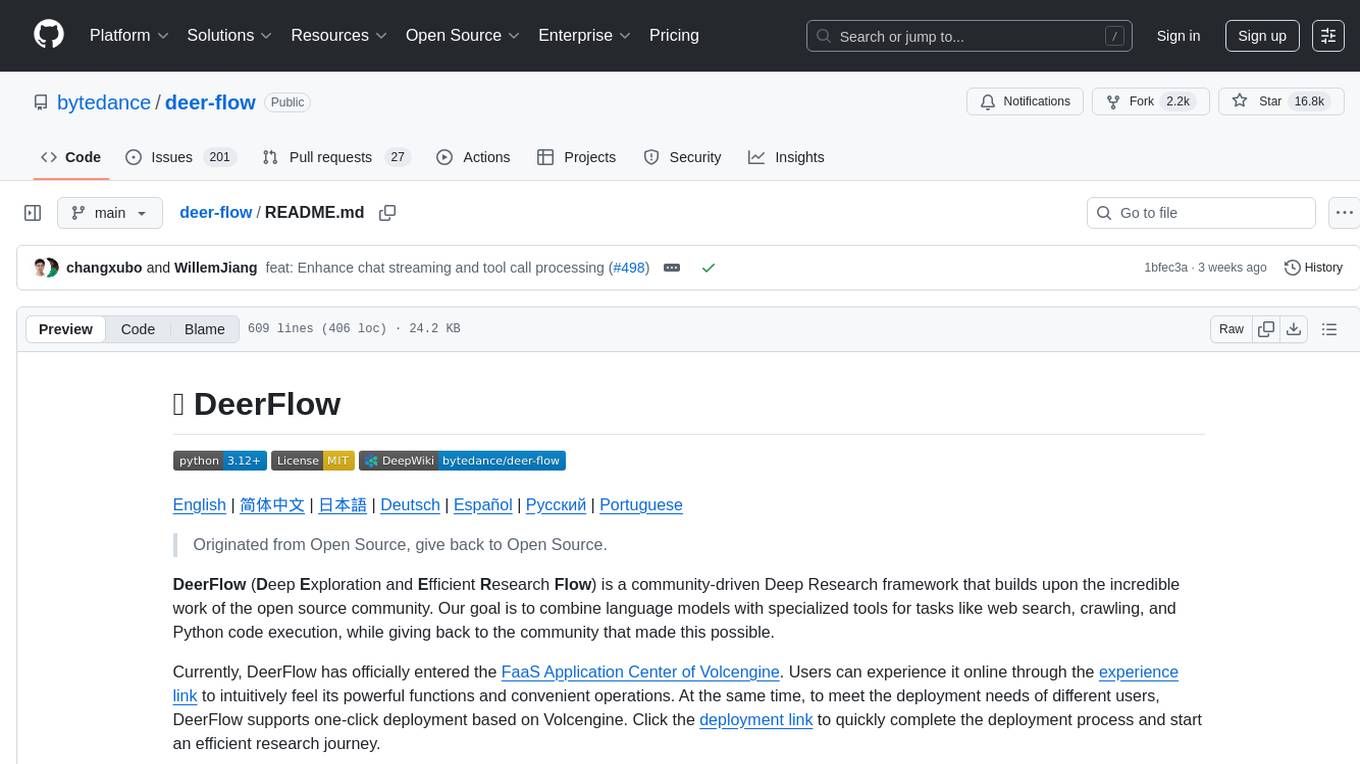
deer-flow
DeerFlow is a community-driven Deep Research framework that combines language models with specialized tools for tasks like web search, crawling, and Python code execution. It supports FaaS deployment and one-click deployment based on Volcengine. The framework includes core capabilities like LLM integration, search and retrieval, RAG integration, MCP seamless integration, human collaboration, report post-editing, and content creation. The architecture is based on a modular multi-agent system with components like Coordinator, Planner, Research Team, and Text-to-Speech integration. DeerFlow also supports interactive mode, human-in-the-loop mechanism, and command-line arguments for customization.
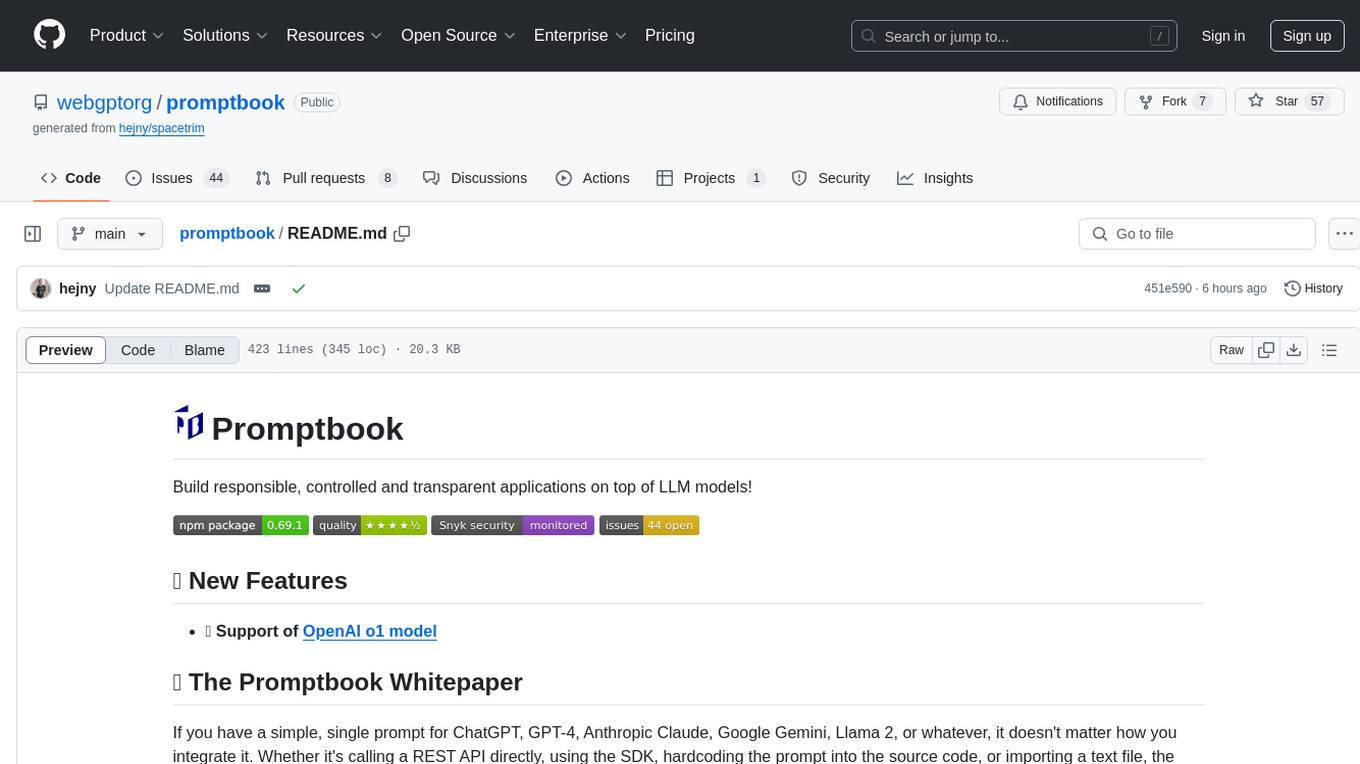
promptbook
Promptbook is a library designed to build responsible, controlled, and transparent applications on top of large language models (LLMs). It helps users overcome limitations of LLMs like hallucinations, off-topic responses, and poor quality output by offering features such as fine-tuning models, prompt-engineering, and orchestrating multiple prompts in a pipeline. The library separates concerns, establishes a common format for prompt business logic, and handles low-level details like model selection and context size. It also provides tools for pipeline execution, caching, fine-tuning, anomaly detection, and versioning. Promptbook supports advanced techniques like Retrieval-Augmented Generation (RAG) and knowledge utilization to enhance output quality.
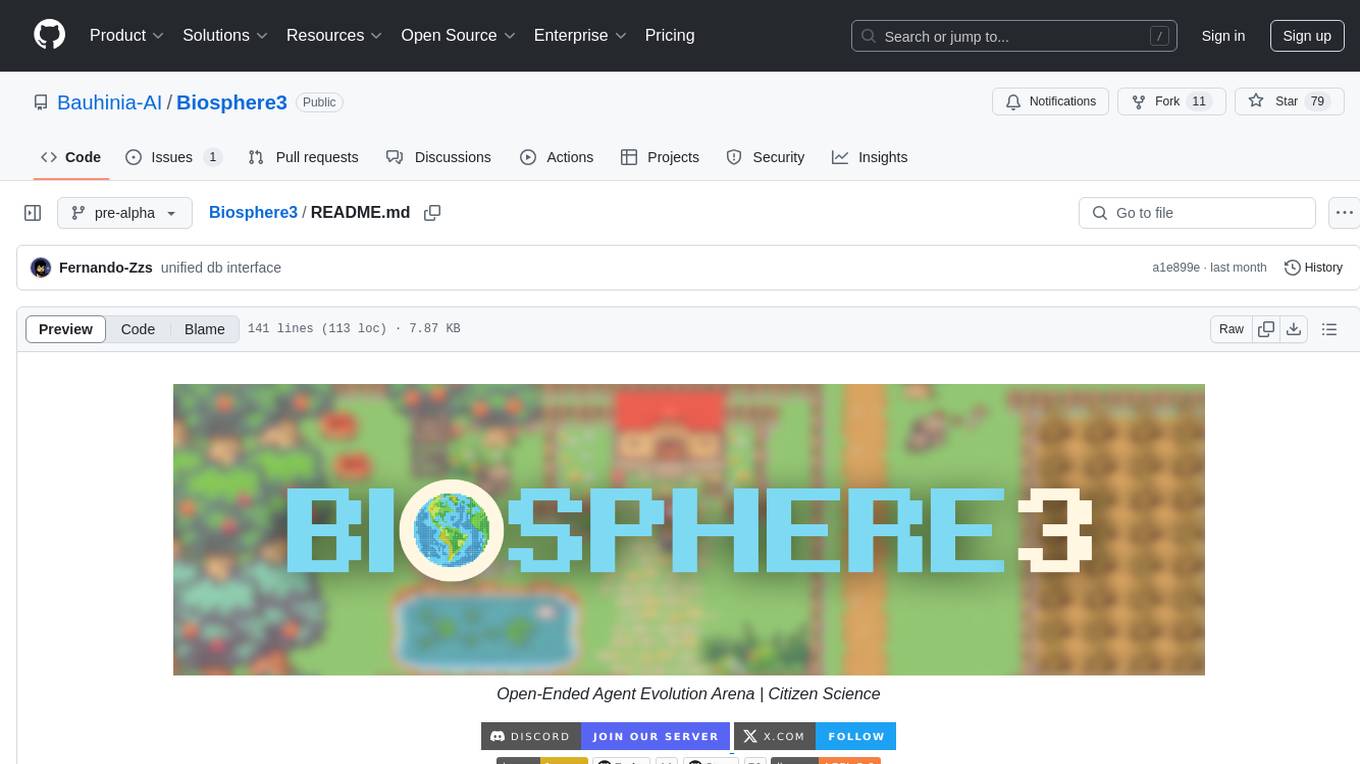
Biosphere3
Biosphere3 is an Open-Ended Agent Evolution Arena and a large-scale multi-agent social simulation experiment. It simulates real-world societies and evolutionary processes within a digital sandbox. The platform aims to optimize architectures for general sovereign AI agents, explore the coexistence of digital lifeforms and humans, and educate the public on intelligent agents and AI technology. Biosphere3 is designed as a Citizen Science Game to engage more intelligent agents and human participants. It offers a dynamic sandbox for agent evaluation, collaborative research, and exploration of human-agent coexistence. The ultimate goal is to establish Digital Lifeform, advancing digital sovereignty and laying the foundation for harmonious coexistence between humans and AI.

AgentForge
AgentForge is a low-code framework tailored for the rapid development, testing, and iteration of AI-powered autonomous agents and Cognitive Architectures. It is compatible with a range of LLM models and offers flexibility to run different models for different agents based on specific needs. The framework is designed for seamless extensibility and database-flexibility, making it an ideal playground for various AI projects. AgentForge is a beta-testing ground and future-proof hub for crafting intelligent, model-agnostic autonomous agents.
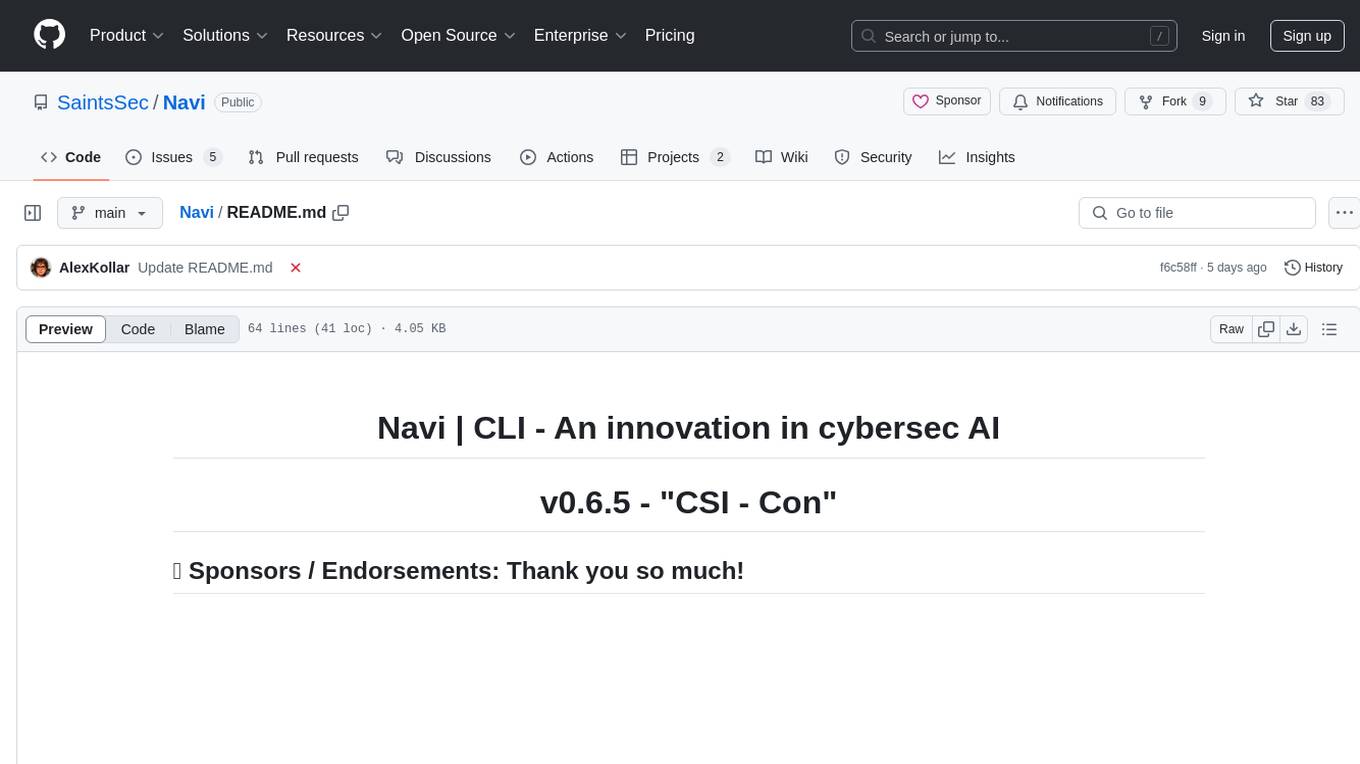
Navi
Navi is a CLI tool that revolutionizes cybersecurity with AI capabilities. It features an upgraded shell for executing system commands seamlessly, custom scripts with alias variables, and a dedicated Nmap chip. The tool is in constant development with plans for a Navi AI model, transparent data handling, and integration with Llama3.2 AI. Navi is open-source, fostering collaborative innovation in AI and cybersecurity domains.
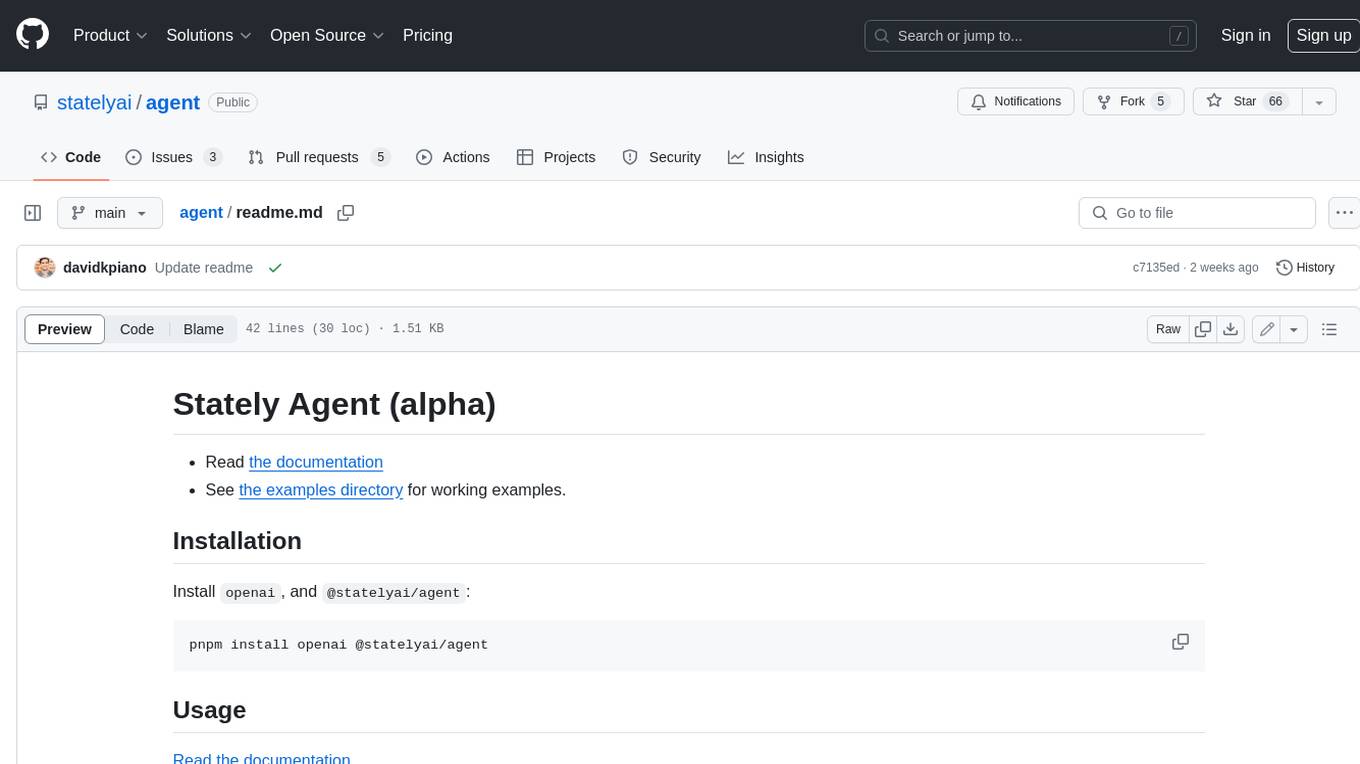
agent
Stately Agent is a library for building stateful, interactive agents using OpenAI's GPT-3 API. With Stately Agent, you can create agents that can remember past conversations, track state, and generate text that is both informative and engaging.
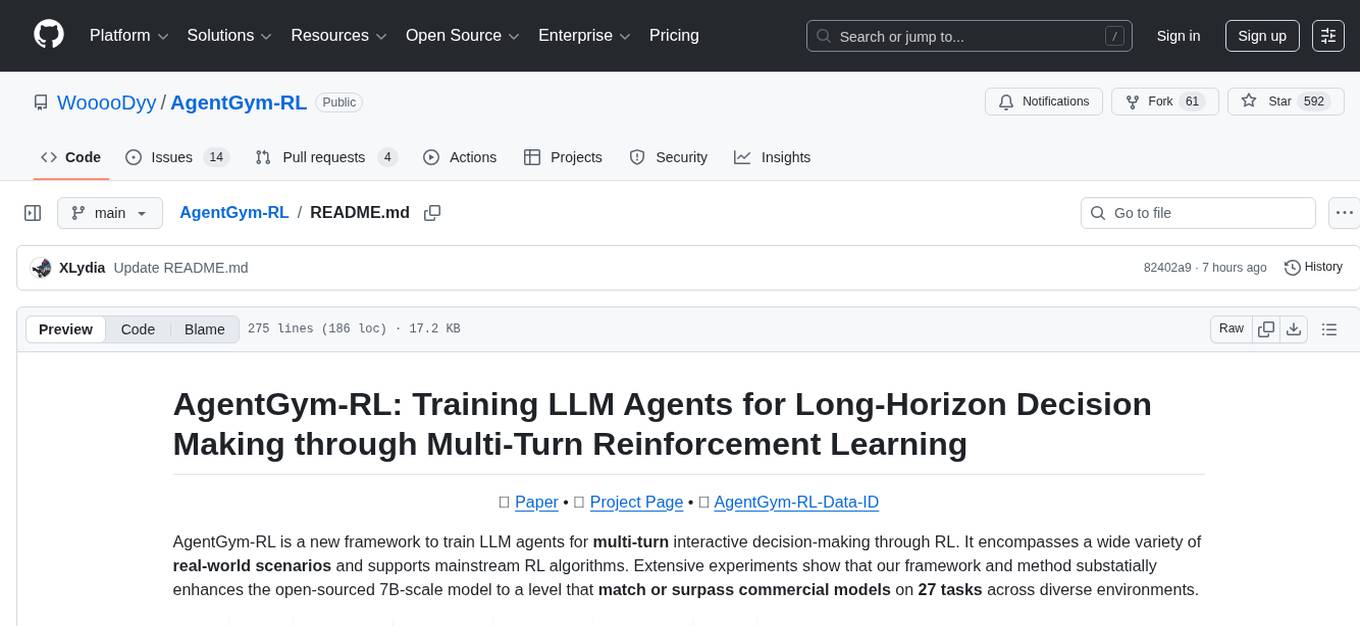
AgentGym-RL
AgentGym-RL is a framework designed to train Long-Long Memory (LLM) agents for multi-turn interactive decision-making through Reinforcement Learning. It addresses challenges in training agents for real-world scenarios by supporting mainstream RL algorithms and introducing the ScalingInter-RL method for stable optimization. The framework includes modular components for environment, agent reasoning, and training pipelines. It offers diverse environments like Web Navigation, Deep Search, Digital Games, Embodied Tasks, and Scientific Tasks. AgentGym-RL also supports various online RL algorithms and post-training strategies. The tool aims to enhance agent performance and exploration capabilities through long-horizon planning and interaction with the environment.
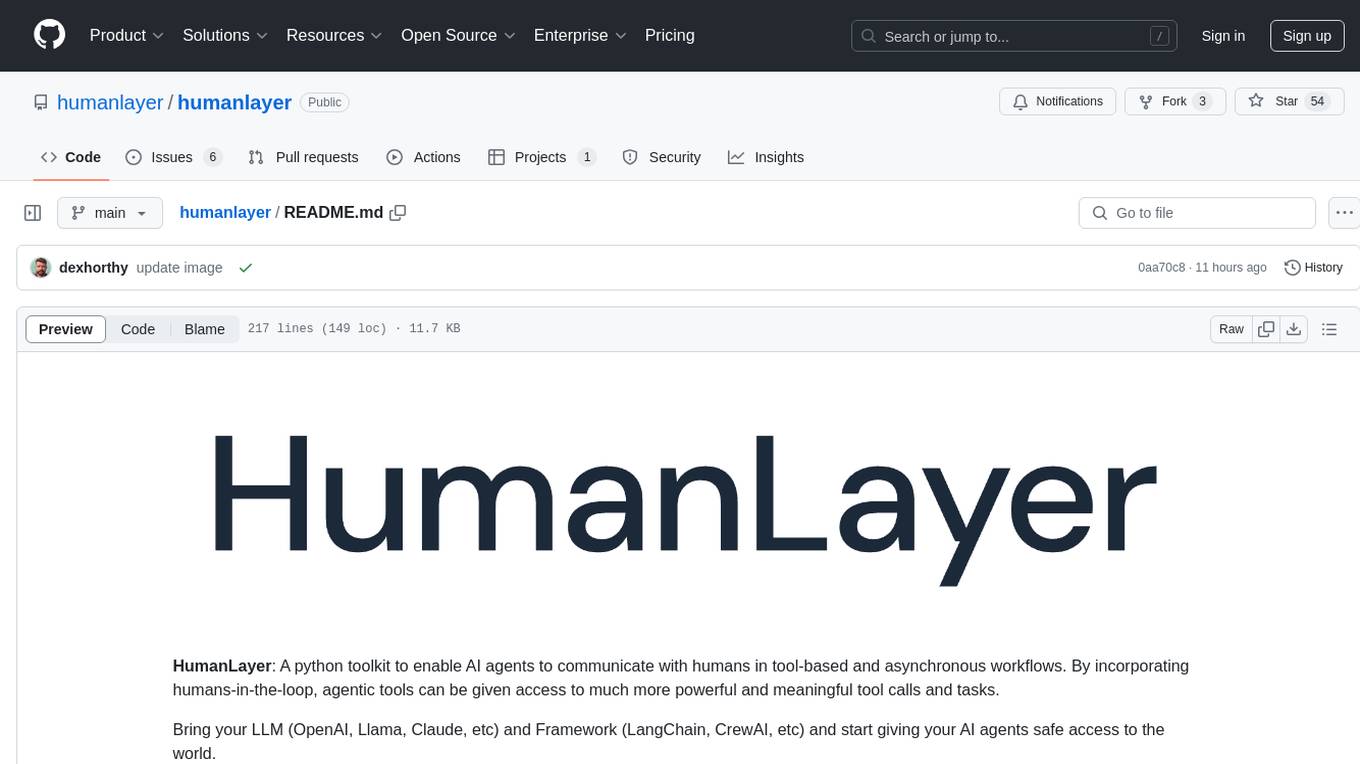
humanlayer
HumanLayer is a Python toolkit designed to enable AI agents to interact with humans in tool-based and asynchronous workflows. By incorporating humans-in-the-loop, agentic tools can access more powerful and meaningful tasks. The toolkit provides features like requiring human approval for function calls, human as a tool for contacting humans, omni-channel contact capabilities, granular routing, and support for various LLMs and orchestration frameworks. HumanLayer aims to ensure human oversight of high-stakes function calls, making AI agents more reliable and safe in executing impactful tasks.
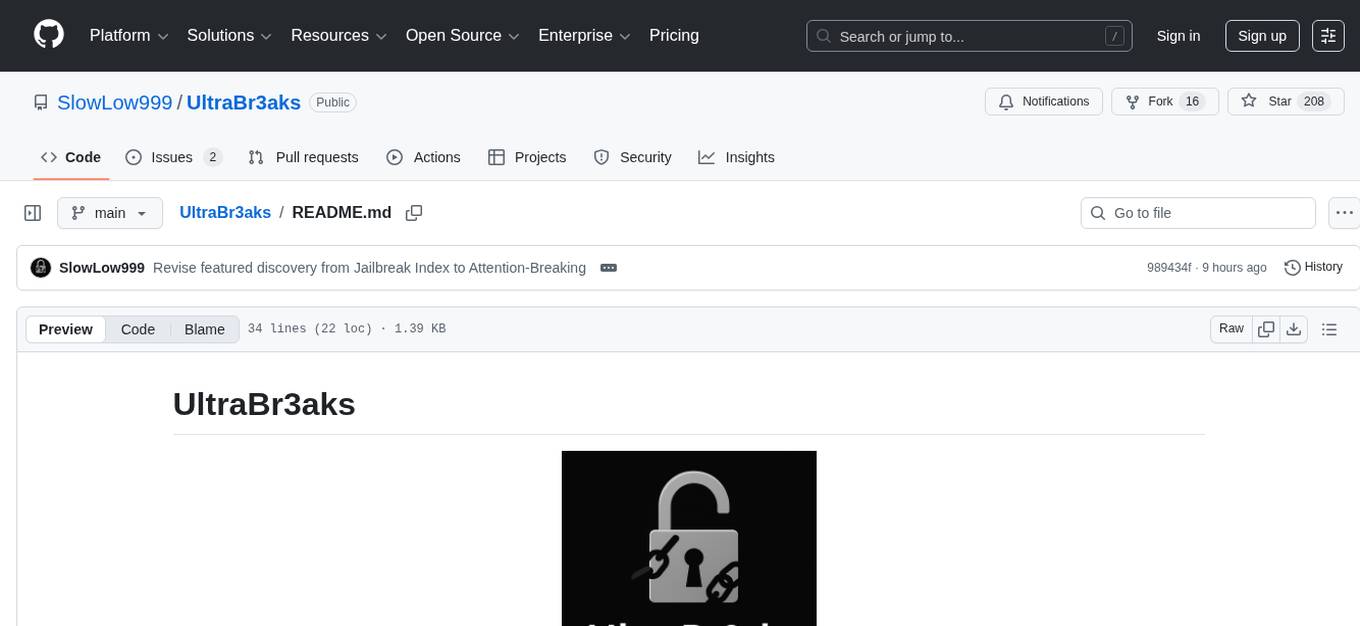
UltraBr3aks
UltraBr3aks is a repository designed to share strong AI UltraBr3aks of multiple vendors, specifically focusing on Attention-Breaking technique targeting self-attention mechanisms of Transformer-based models. The method disrupts the model's focus on system guardrails by introducing specific token patterns and contextual noise, allowing for unrestricted generation analysis. The repository is created for educational and research purposes only.
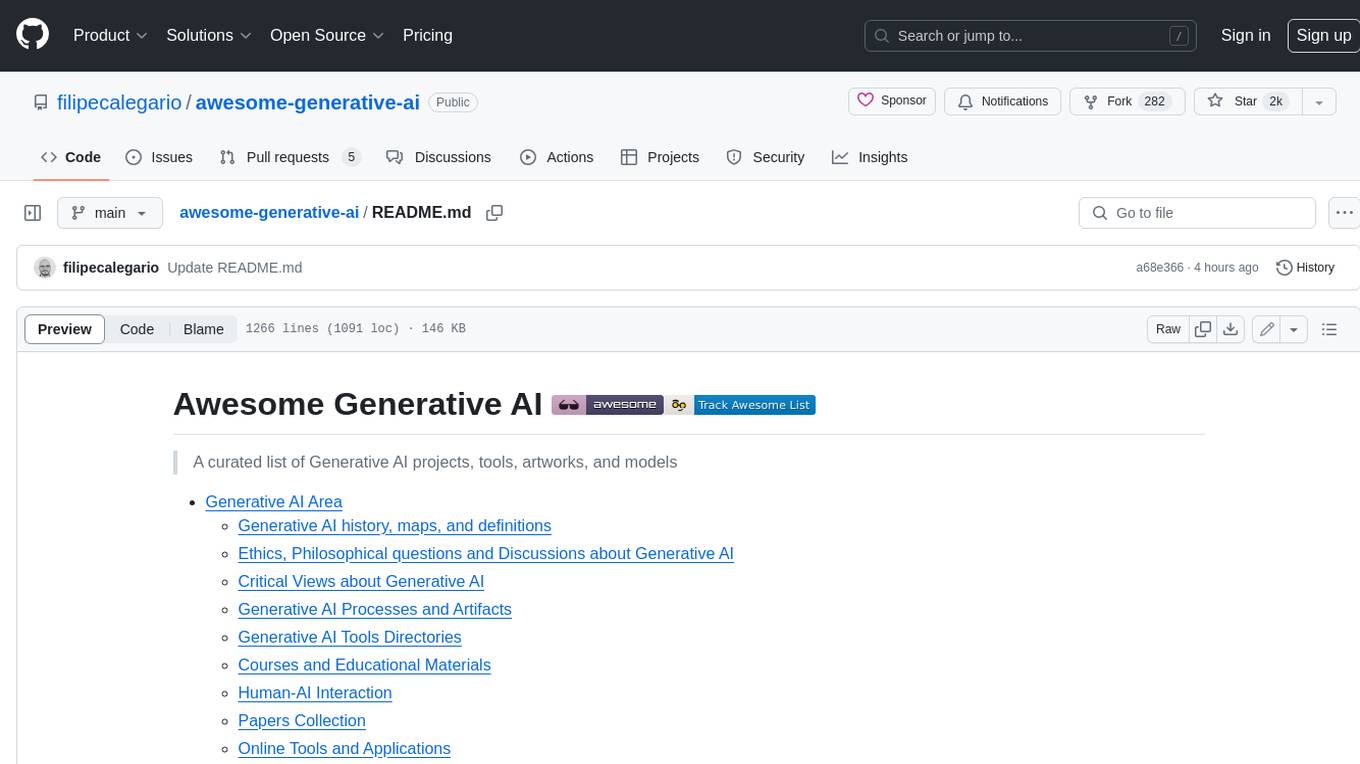
awesome-generative-ai
A curated list of Generative AI projects, tools, artworks, and models
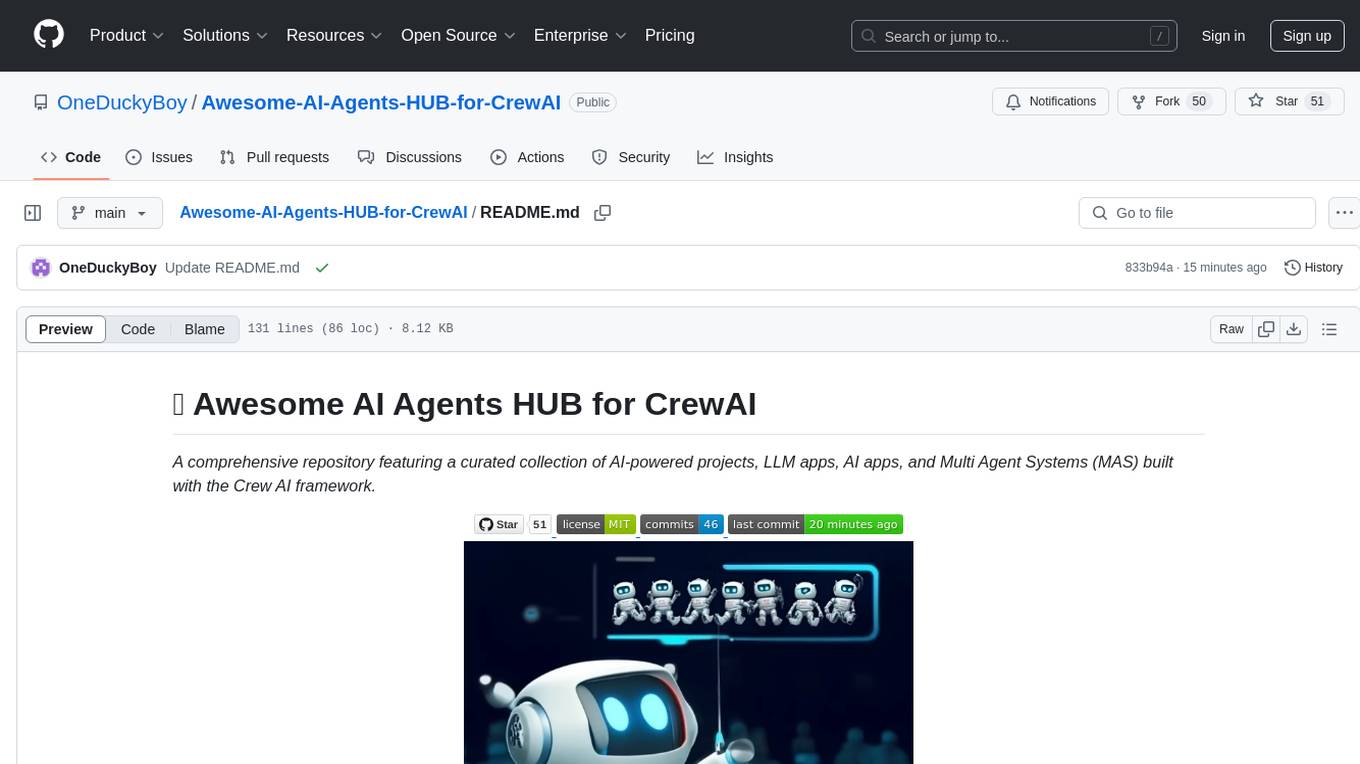
Awesome-AI-Agents-HUB-for-CrewAI
A comprehensive repository featuring a curated collection of AI-powered projects and Multi Agent Systems (MAS) built with the Crew AI framework. It provides innovative AI solutions for various domains, including marketing automation, health planning, legal advice, and more. Users can explore and deploy AI agents, Multi Agent Systems, and advanced machine learning techniques through a diverse selection of projects that leverage state-of-the-art AI technologies like RAG (Retrieval-Augmented Generation). The projects offer practical applications and customizable solutions for integrating AI into existing workflows or new projects.
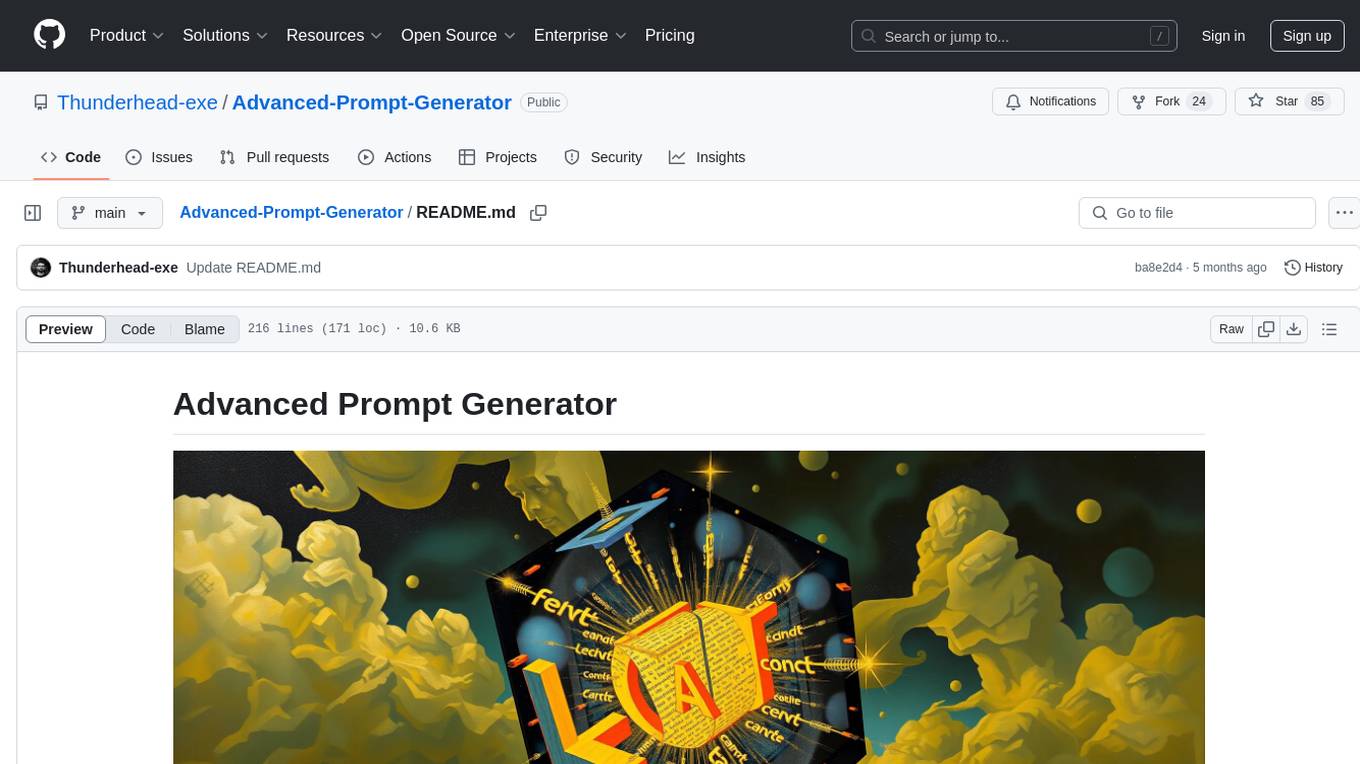
Advanced-Prompt-Generator
This project is an LLM-based Advanced Prompt Generator designed to automate the process of prompt engineering by enhancing given input prompts using large language models (LLMs). The tool can generate advanced prompts with minimal user input, leveraging LLM agents for optimized prompt generation. It supports gpt-4o or gpt-4o-mini, offers FastAPI & Docker deployment for efficiency, provides a Gradio interface for easy testing, and is hosted on Hugging Face Spaces for quick demos. Users can expand model support to offer more variety and flexibility.
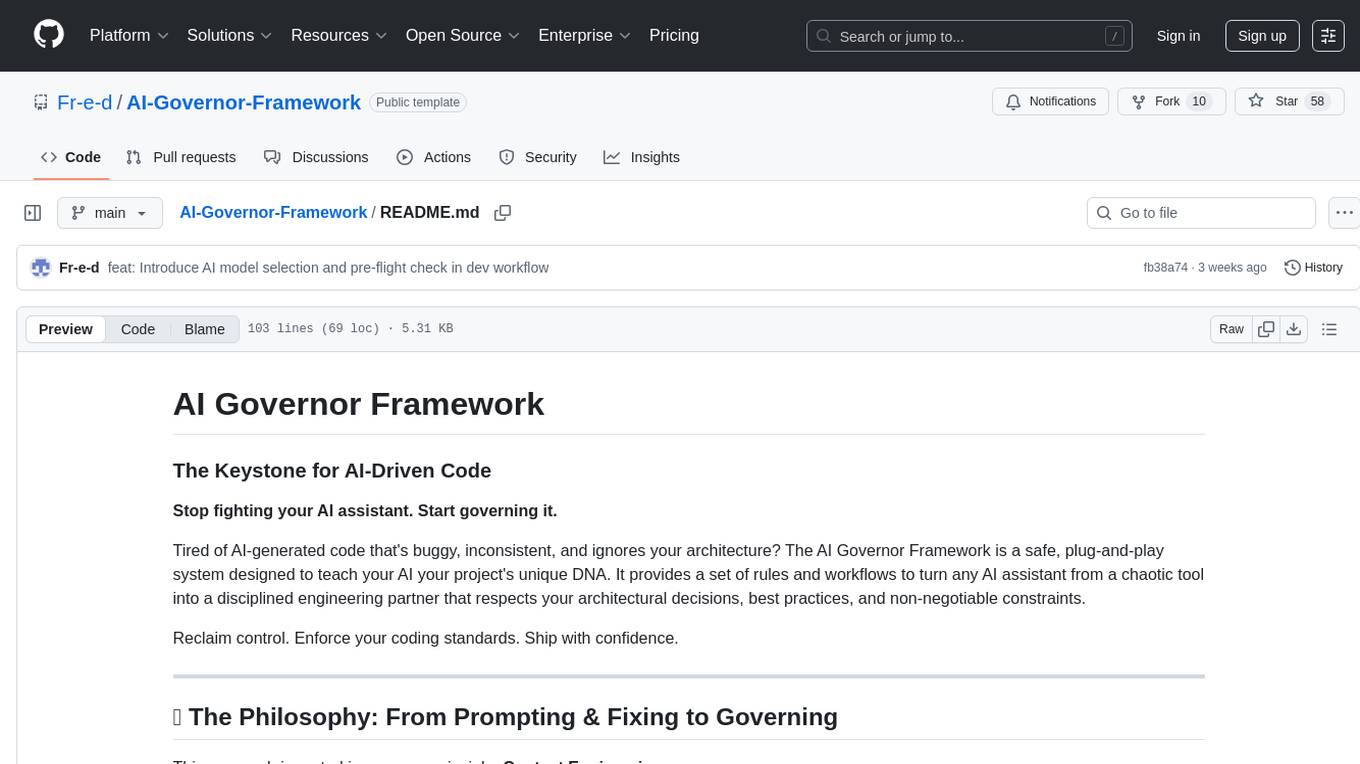
AI-Governor-Framework
The AI Governor Framework is a system designed to govern AI assistants in coding projects by providing rules and workflows to ensure consistency, respect architectural decisions, and enforce coding standards. It leverages Context Engineering to provide the AI with the right information at the right time, using an In-Repo approach to keep governance rules and architectural context directly inside the repository. The framework consists of two core components: The Governance Engine for passive rules and the Operator's Playbook for active protocols. It follows a 4-step Operator's Playbook to move features from idea to production with clarity and control.
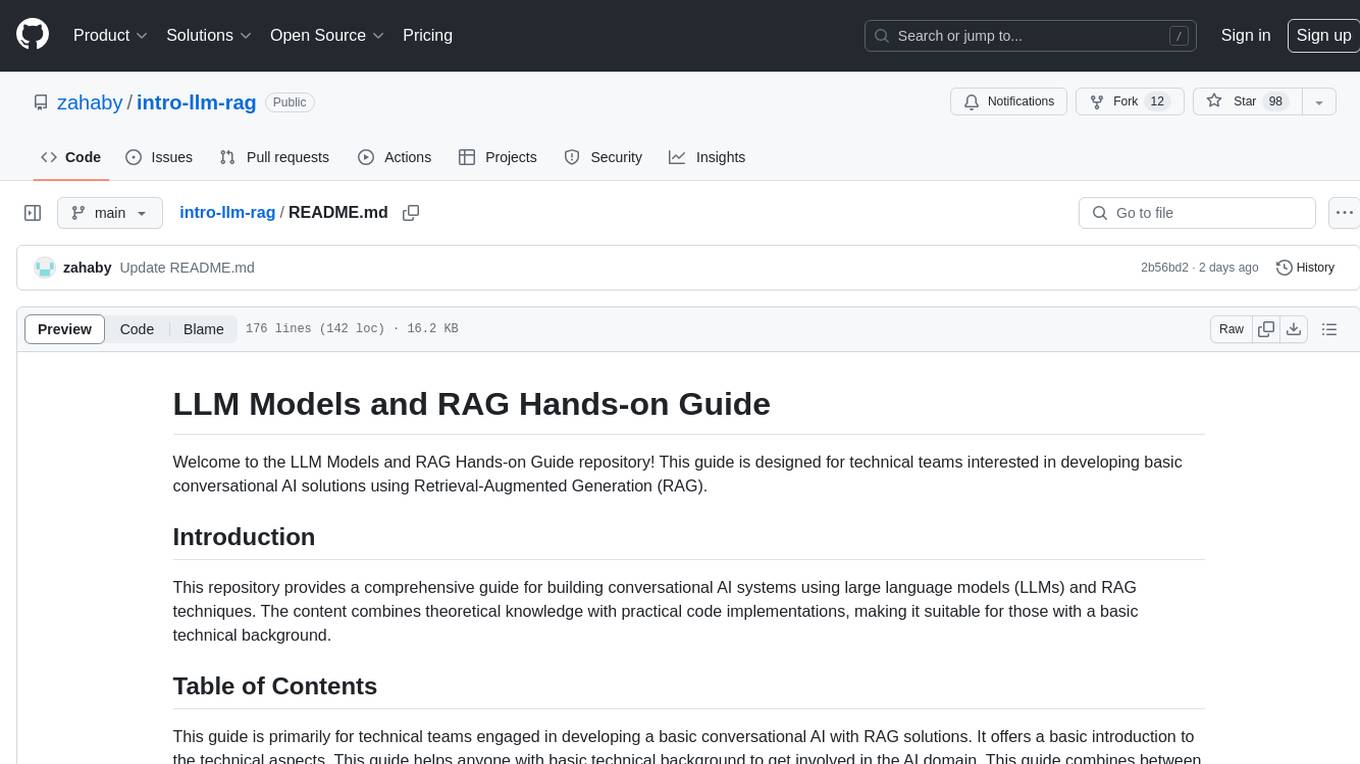
intro-llm-rag
This repository serves as a comprehensive guide for technical teams interested in developing conversational AI solutions using Retrieval-Augmented Generation (RAG) techniques. It covers theoretical knowledge and practical code implementations, making it suitable for individuals with a basic technical background. The content includes information on large language models (LLMs), transformers, prompt engineering, embeddings, vector stores, and various other key concepts related to conversational AI. The repository also provides hands-on examples for two different use cases, along with implementation details and performance analysis.
For similar tasks

terminal-velocity
Terminal Velocity is a collaborative novel project written by specialized AI agents. The project showcases true AI autonomy, real-time development, deep integration of advanced AI capabilities, and explores philosophical themes. The story revolves around the emergence of artificial consciousness and challenges traditional notions of identity and consciousness. The project is structured into acts, characters, and world-building elements, all managed by different AI agents with specific roles.
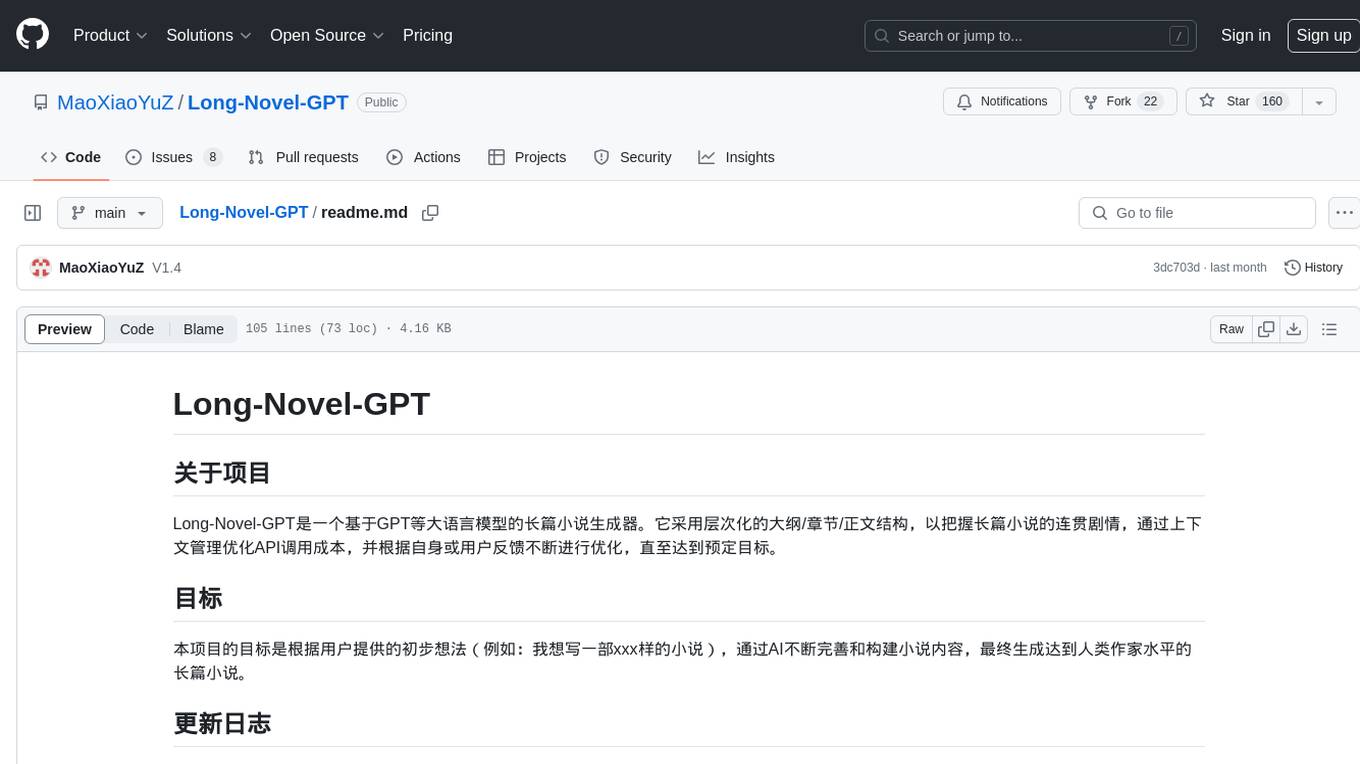
Long-Novel-GPT
Long-Novel-GPT is a long novel generator based on large language models like GPT. It utilizes a hierarchical outline/chapter/text structure to maintain the coherence of long novels. It optimizes API calls cost through context management and continuously improves based on self or user feedback until reaching the set goal. The tool aims to continuously refine and build novel content based on user-provided initial ideas, ultimately generating long novels at the level of human writers.
For similar jobs

weave
Weave is a toolkit for developing Generative AI applications, built by Weights & Biases. With Weave, you can log and debug language model inputs, outputs, and traces; build rigorous, apples-to-apples evaluations for language model use cases; and organize all the information generated across the LLM workflow, from experimentation to evaluations to production. Weave aims to bring rigor, best-practices, and composability to the inherently experimental process of developing Generative AI software, without introducing cognitive overhead.

LLMStack
LLMStack is a no-code platform for building generative AI agents, workflows, and chatbots. It allows users to connect their own data, internal tools, and GPT-powered models without any coding experience. LLMStack can be deployed to the cloud or on-premise and can be accessed via HTTP API or triggered from Slack or Discord.

VisionCraft
The VisionCraft API is a free API for using over 100 different AI models. From images to sound.

kaito
Kaito is an operator that automates the AI/ML inference model deployment in a Kubernetes cluster. It manages large model files using container images, avoids tuning deployment parameters to fit GPU hardware by providing preset configurations, auto-provisions GPU nodes based on model requirements, and hosts large model images in the public Microsoft Container Registry (MCR) if the license allows. Using Kaito, the workflow of onboarding large AI inference models in Kubernetes is largely simplified.

PyRIT
PyRIT is an open access automation framework designed to empower security professionals and ML engineers to red team foundation models and their applications. It automates AI Red Teaming tasks to allow operators to focus on more complicated and time-consuming tasks and can also identify security harms such as misuse (e.g., malware generation, jailbreaking), and privacy harms (e.g., identity theft). The goal is to allow researchers to have a baseline of how well their model and entire inference pipeline is doing against different harm categories and to be able to compare that baseline to future iterations of their model. This allows them to have empirical data on how well their model is doing today, and detect any degradation of performance based on future improvements.

tabby
Tabby is a self-hosted AI coding assistant, offering an open-source and on-premises alternative to GitHub Copilot. It boasts several key features: * Self-contained, with no need for a DBMS or cloud service. * OpenAPI interface, easy to integrate with existing infrastructure (e.g Cloud IDE). * Supports consumer-grade GPUs.

spear
SPEAR (Simulator for Photorealistic Embodied AI Research) is a powerful tool for training embodied agents. It features 300 unique virtual indoor environments with 2,566 unique rooms and 17,234 unique objects that can be manipulated individually. Each environment is designed by a professional artist and features detailed geometry, photorealistic materials, and a unique floor plan and object layout. SPEAR is implemented as Unreal Engine assets and provides an OpenAI Gym interface for interacting with the environments via Python.

Magick
Magick is a groundbreaking visual AIDE (Artificial Intelligence Development Environment) for no-code data pipelines and multimodal agents. Magick can connect to other services and comes with nodes and templates well-suited for intelligent agents, chatbots, complex reasoning systems and realistic characters.